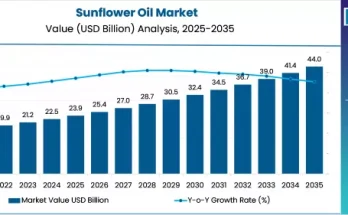Plant-based food industry is one of the sectors witnessing massive uproar across the globe. Plant-based foods are gaining immense popularity as consumers are inclining towards sustainability and hygiene to maintain their physical as well as mental health. As awareness regarding health and clean diet is surging among Gen-Zs and Gen-Alphas, plant-based food diet is no longer a fad. These food products are gaining wider acceptance and popularity at an incredible pace across the globe.
Now, when it comes to plant-based food products or diet, there is often confusion between vegan diet and a plant-based diet. With the plant-based food diet, there is always a possibility of consuming eggs or sea food to maintain the regular protein intake. However, veganism restricts the consumption of every and any animal-based or dairy-based food products.
Adopting a plant-based food diet have numerous health benefits and advantages such as improved metabolism, cleaner digestive system, and of course, no animal cruelty. The focus is mostly on the consumption of foods that are naturally sourced from plants. As obesity becomes critical disorder among the younger population, health experts and nutrition education specialists around the globe are advocating the benefits of following a plant-based food diet.
Plant-based food product not only helps in flushing out the toxins, but it also helps in boosting the immune system and reduces inflammation. Having said that, the number of people adopting a vegan diet or flexitarian diet are mounting at a robust pace. Over the past half-decade, the number of people adopting plant-based food diet quadrupled by 2019 and the number is expected to go up over the upcoming decade, says Viva-The Vegan Charity.
Fast-Food Giants Tapping into Plant-based Industry to Make Big Bucks!
As plant-based food market continue to witness billion-dollar opportunity across the globe, food companies are investing extensively in producing plant-based food products. Be it plant-based eggs, plant-based ice-cream, or plant-based cheese, the food industry has come a long way in catering to the unique desires of consumers in a healthy way.
Growing awareness regarding the risk factors of consuming meat or animal products has certainly increased the consumption of plant-based food products. Research studies suggests, consumption of red meat and processed meat products on a daily basis increases the risk of diabetes, hyper-tension, cardiovascular diseases, cancer, and obesity.
Hence, every 3 out of 5 consumers are searching for best plant-based food diet and products every day, as per a recent survey. While a significant number of demographic still chooses to include animal-based products in their diet, the intake has reduced. These flexitarians are satisfying their taste-buds as well as keeping up with their heath through plant-based food diet.
To capitalize on this, several fast-food giants are coming up with innovative ideas and diversifying their menus with plant-based food products. For instance, Starbucks hopped on the plant-based food trend in 2020 and announced the launch of a range of products to satisfy the craving of Starbucks-lovers.
Starbucks is now offering a wide range of plant-based food & beverage products such as vegan sausage roll, plant-based croissant bun, and plant-based dairy products across the globe. Another leading name, McDonald is not far behind when it comes to joining the bandwagon of plant-based food. Co-developed with Beyond Meat, McDonald announced the launch of McPlant plant-based burger patty to satisfy the craving of meat-lovers.
Likewise, in 2022, Licious, a well-known meat-startup, announced the launch of its plant-based brand, UnCrave, setting the foot in its alternative industry. This D2C brand will diversify the brands product portfolio and is expected to offer rich delicacies for vegetarians and flexitarians. The company announced the launch of vegetarian chicken and plant-based mutton seekh kebabs to increase their brand value and reach out the vegan audience.
As the opportunities in the plant-based food industry unfolds, key players are amplifying their efforts in strengthening their footprints. Dominos, in December 2022, announced the launch of vegan rocket veggie with vegan mozzarella in France. Leading brands in dairy industry are also catching up with plant-based food fad as they launch plant-based ice-creams.
Online Food Delivery, Social Media, & e-Commerce Platforms: Stairway to Profits!
The idea to clean air, sustainable atmosphere, and healthy living is a tough feat to achieve for the young generation. While global carbon emissions are rising and animal cruelty is still a critical factor in the society, consumers have taken one-step ahead in the right direction by adopting plant-based food diet!
Until a decade ago, food was merely a necessity and the term “foodie” was not prevalent. However, with the widespread penetration of digitization and social media, food has now become an aesthetic and mantra for living life. As the zest for tasting every cuisine continues to surge among consumers, inclination towards sustainability and healthy living has also increased.
With the growing consciousness towards animal cruelty and healthy living, consumers are now adopting vegan and plant-based food dietary lifestyle. Social media and e-commerce industry has played a vital role in encouraging the trend, especially among the younger generation. Leading brands are now collaborating with social media influencers and e-commerce giants to expand their global reach and improve their brand presence.
Some of the leading plant-based food brands such as Beyond Meat, Impossible Foods, Amy’s Kitchen, Daiya, Danone, Eat Just, and others are prioritizing social media marketing campaigns and are joining forces with brands like Amazon and e-Bay to increase their revenue. Post-pandemic the world is relying heavily on online transactions and online food delivery platforms has certainly made the lives easier.
Big brands and incumbents like Beyond Meat and Licious, hence, are now reaching their customers through these applications. As the Gen-Zs and millennials are accessing the world through their fingertips, leading companies are racing to gain revenue through these digital platforms.
As scope of investment in plant-based food sector rises at a staggering rate, leading retailers are lining up to pave their way in this multi-billion industry. For instance, in April 2022, Planet Based Foods announced the launch of its plant-based meat alternatives products on Amazon.com. Meanwhile, in November 2021, Feel Foods unveiled its new plant-based e-commerce platform.
Although Beyond Meat is a leading name in the plant-based food industry, the company is likely to reach new heights through its joint venture with the leading Chinese e-commerce platform Pinduoduo in March 2022. As these platforms continue to influence the lives positively, it is expected that the plant-based food industry will transform the face of food chain across the globe.
Are there Any Negatives of a Plant-based Diet?
Although the plant-based food market is climbing the ladder of success, albeit one step at a time, there are some hurdles in the graph of the success. Here are some of the challenges that the companies might face in the plant-based food market:
Product Formulation and Texture: While the vegans are not bothered with the familiarity and texture of plant-based food products, meat-lovers turned flexitarians might face the issue. The texture of plant-based meat products while may be similar, but the taste might not be the same. Foodies who are equally environmental conscious face the same dilemma as the plant-based companies are facing. Hence, leading players are trying to overcome this challenge by developing plant-based meat products that are similar in terms of texture, appearance, and taste.
High Production/Operating Cost: With stringent regulations in place associated to the handling, transportation and manufacturing of plant-based products, the start-ups and companies in developing economies are facing major challenges.
Fierce Competition: As plant-based food products gains traction, the competition in the market is growing significantly. With established big names in the industry such as Beyond Meat, Danone, Daiya Food, and Amy’s Kitchen, start-ups are likely to witness immense competition. Hence, some of the start-ups are targeting developing nations such as Japan, China, India, and Brazil to improve their revenue and maintain their position. However, lack of infrastructure, high-cost of production and maintenance, and technology might restrain the growth.
Strategies to Aid the Incumbents and Leading Plant-based Food Companies
While plant-based food industry is booming, there are numerous challenges that the leading players and start-ups needs to overcome. Collaboration with e-commerce and domestic online food platforms is one of the most profitable paths for the companies to gain revenue and expand their customer base. For sustainable growth, Fact.MR opines established players in this space are likely to benefit from innovative designs and government funding.
Some of the companies are also collaborating with farmers and government to keep the supply of raw material intact and avoid the losses. For instance, in 2021, Lupin Platform Inc., Lumi Foods, Hensall Co-op., and PURIS, collectively, established an integrated ecosystem to increase the production and processing of Lupin in Canada. Lupin is an emerging crop extensively used for developing high-quality plant-based protein ingredients.
It’s a Wrap!
Plant-based food industry is expected revolutionize the face of global food industry. As companies are investing extensively in research activities to develop innovative products and gain profits, the market will witness tremendous growth opportunities in the next decade. Fact.MR estimates the plant-based food market will grow at a staggering rate as consumers become more eco-conscious and companies pave their way to the road of sustainability.


